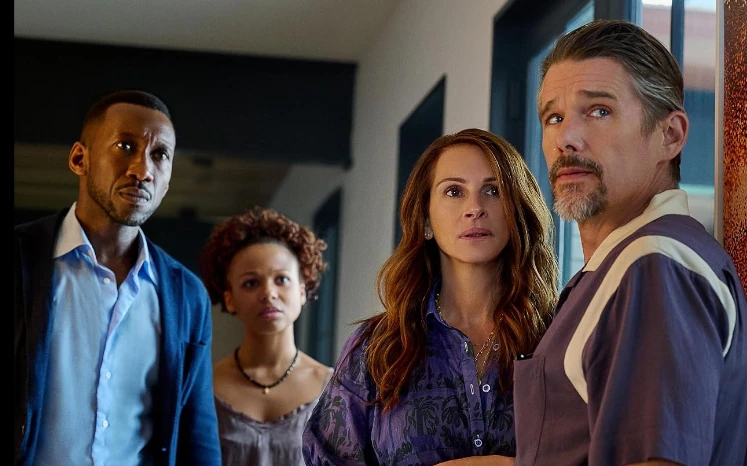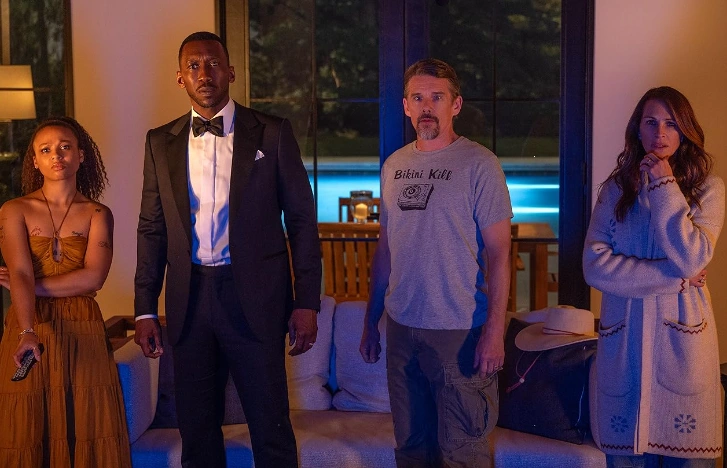Read It or Stream It? Leave the World Behind

This is the first installment in my ongoing series: “Read It or Stream It?,” where I compare the book and movie version of a story, and let you know if both (or neither) are truly worth your time.
This week I’m focusing on Leave the World Behind, a novel by Rumaan Alam and movie released on Netflix, starring Ethan Hawke, Julia Roberts, Mahershala Ali, and Kevin Bacon.
The story focuses on Clay and Amanda, who are leaving New York City with their two children to spend some time at a vacation home on Long Island. As soon as they arrive at the property, bizarre and apocalyptic things start happening, and then suddenly, the owners of the home, G.H. and Ruth Washington, appear unannounced on the doorstep. The rest of the novel follows these four protagonists as they wrestle with a looming disaster (of which they do not know the cause).
I read the book first, listening to it on audiobook as I drove my daughter to school this week. Alam’s prose is rich and descriptive throughout the book, immersing you in the experience of the characters, but sometimes I found his writing to be a bit distracting and heavy-handed. Given the overall “end-of-the-world” scenario in the book, I found myself, as a reader, expecting a more plot-driven book.
As I made my way through the book, I found myself growing impatient as a reader about the lack of clarity about the disaster surrounding the characters. The plot confused me, and I found myself wondering, more than once, “What is happening?” However, when I reached the last page, I reluctantly admitted that Alam had managed to tie it all together in a way that made so much more sense and made me think. Although I struggled to finish this book, I’m grateful that I did. I was able to see the larger tension that the characters were immersed in: It wasn’t about the particulars of the disaster that was unfolding around them, it was about who they become in the midst of crisis and disaster.

I finished the book the day before the movie was released on Netflix. I watched it with as much of an open mind as I could muster (given my slight frustration with the book), and I have to say, I was genuinely and pleasantly surprised. The movie veers from the book in slight ways, but according to Alam, the differences were still “emotionally faithful to the book.”
The performances in the movie were all top notch: Julia Roberts portrays the anxious nature of a mom, a white woman who finds herself suddenly in the presence of black people (trying to belie her own biases), and someone who is not very emotionally self-aware, but is trying her best to take care of her family. Ethan Hawke truly manifests life the tired resignation of Clay, complying with his wife’s last-minute plans, trying to not give into her reactivity or his own sense of overwhelm. Mahershala Ali shines as G.H., always trying to keep his cool on the outside, while his anger and exhaustion and fear are simmering just beneath the surface. Myha’la is G.H.’s snarky and wise daughter, Ruth, weaving her suspicion and heightened awareness into a strategy to keep herself and her father safe. (Note: Ruth is G.H.’s wife in the book, and they are an elderly couple, as opposed to the young father and daughter portrayed in the film.) The two actors playing Clay and Amanda’s children, Archie and Rosie (Charlie Evans and Farrah McKenzie), both bring their own poignant performances to the processing of building tension and solidifying the weight in my gut as I watched the film.
And, last but not least, Kevin Bacon is always a scene stealer. He only appears onscreen for a few moments during the film, completely transforming into the character of Danny, G.H.’s doomsday prepper neighbor. Early on in the book, Alam uses the phrase “six degrees of separation” a few times, and I couldn’t help but wonder if Kevin Bacon’s casting was a slight nod to that turn of phrase. (Did anyone else grow up playing Six Degrees to Kevin Bacon? Best road trip game ever, IMO.)
While the nature or cause of the disaster remains unclear throughout the book, there are definitely more clues and signs provided in the movie that leave the audience wondering and thinking about all of the possible dystopian directions of our own society. I can see how Sam Esmail (who did a phenomenal job with Mr. Robot) builds a thoughtful and deliberately confusing tension into this film, which ends up leaving us all wondering and wrestling with questions and uncertainties long after the credits roll.
I can also see the Obamas’ production mark on this film as well: The societal commentary present here on the U.S. and our role in the world was not lost on me.
So, if you’re wondering whether to read it or stream it, my recommendation would be:
Read It! (But only if you like slow-burn, character-driven novels with very poetic and flowery prose that have a philosophical undertone.)
Stream It! I have not been able to stop thinking about this movie since I finished it. It’s long, but worth it.
Pick up your own copy of Leave the World Behind or stream it on Netflix.
Like this project
Posted Jan 23, 2024
A blog post reviewing both the book by Rumaan Alam and the Netflix film of "Leave the World Behind."




